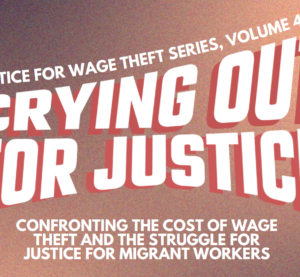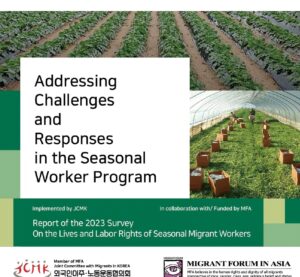Circular 18: Global Compact for Migration: 2nd Intergovernmental Negotiations Meeting
— March 27, 2018Dear Friends,
Hope all goes well. Greetings from Migrant Forum in Asia.
We are writing to share with you updates on the 2nd round of the Intergovernmental Negotiations Meeting on the Global Compact for Safe, Orderly, and Regular Migration. The 2nd Negotiations Meeting was held in the UN Headquarters in New York on 12-15 March 2018.
As you may know the modality for the recently concluded negotiations meeting is different from the 1st meeting. The discussions focused on 4 thematic issues which are as follow:
- Differentiation between irregular and regular
- Differentiation between migrants and refugees
- Implementation and capacity building
- Follow-up and review
The thematic issues mentioned above were the most question / discussed topic during the 1st Negotiations Meeting. The last session of the negotiations meeting revolved around Member-states reiterating / summarizing their positions, comments and suggestions on the Zero Draft Plus.
Differentiation between irregular and regular
The first part of the meeting revolved around discussing the differentiation between irregular and regular as during the 1st round there were a lot of questions raised regarding this. A number of states raised the importance of the Global Compact for Migration having a people-centered approach wherein all core human rights (international agreements) should be applicable to all regardless of status and that migrants (both irregular and regular) should be entitled to rights without discrimination. States have the obligation to respect human rights of all individuals. Basic services such as health care, education, and legal counsel were brought up by a number of Member-states saying that these services should be accessed by migrants regardless of their statuses.
Some Member-states, however, shared that differentiation should be made because this will identify the gaps and vulnerabilities of migrants, both irregular and regular. There were Member-states who highlighted that distinctions should be made in order to identify which needs or access will be given to regular and irregular migrants. This connotes that services will depend on the status of the migrant. Some emphasized that a clear distinction is important to better understand one another. All migrants regardless of status should have access to basic social services, healthcare, legal counsel, housing. However, irregular migrants may not be entitled to the same services, including political rights (particularly mentioned by China).
Differentiation between migrants and refugees
Majority of the countries shared the need to have a clear distinction on who is a migrant and a refugee. Countries such as Austria, mentioned that by mixing the two categories will only result to putting more risks to both migrants and refugees. There is a need to ensure that the two compacts for refugees and migrants do not overlap with one another and that there should be no creation of legal categories. While migrants and refugees face common challenges, the states such as Comoros (on behalf of other African countries) affirms that both are separate groups. There were Member-states who called for the deletion of certain objectives that intersects with refugees. Any issues that relates to refugees should be based on the GCR and not GCM. Migrants who find themselves in vulnerable situations should be able to look into the GCM and be informed from there.
Some Member-states added that complimentary should only be ensured to issues common to both compacts and should be parallel. A complimentary effort should be seen and not simply a matter of legal distinctions.
Further on complementary, there were a number of Member-states who highlighted that there should be a close link between the GCR and the GCM. There should be synergies between two processes and that references to the GCR is necessary on the GCM. There should not be any room for misunderstanding or misrepresentation and that there should be coherence among the two compacts. Complementarity also avoids any protection gaps that lack of cohesion may entail.
Implementation and capacity building
Following the whole of society as well as its 360-degree approach of the GCM, Member-states emphasized the need to involve all stakeholders in the implementation of the provisions in the GCM. This includes civil society, private sectors, and governments among others. Stakeholders in the local level as well as existing regional mechanisms should be given roles in this regard.
Given the non-binding nature of the GCM, a number of Member-states felt the need to have a clarification on how the actionable commitments can fit in the context of the nature of the compact.
Majority of the Member-states support the leading and coordinating role of IOM in the implementation of the GCM. This is mainly because IOM is solely focused on migration aspects and given its expertise, experiences as well as its global presence, the IOM positions itself as the best fit for this particular role. Some Member-states called for a clearer provision in the GCM regarding the role of the IOM.
Follow up and review
SRSG Louise Arbour briefed states on plans to conduct internal consultations within the UN System to aid in the implementation process, as indicated in her report. Consultations will prioritize avoiding unnecessary new structures, ensuring alignments with work on SDGs which has been consistently raised by most of the Member-states.
The UN also noted the increasingly important role of IOM in the UN system, and seek out ways to achieve effective complementarity in two processes, ensuring robust health of legal protection regime for refugees.
The capacity, implementation, follow-up and review discussions were overlapping. The central role of the IOM was emphasized by every speaker, in both this discussion and with respect to implementation, follow-up and review. Nevertheless, states asked for more clarity regarding what this role would entail, and how it would interact with other UN agencies.
Similar to the previous section, there were Member-states who emphasized that the follow up and review should be state-led. There was disagreement about regional mechanisms; most resisted the idea of the Regional Economic Forums due to the fact that there are existing regional mechanisms that are already in place.
Member-states raised that the with regard to the frequency of the review process, it should take place every 2 years instead of 4.
Co-facilitator Gomez-Camacho explained that they wrote the final section of the zero draft of the GCM with the intention of avoiding the creation of new categories or points. They wanted to keep it simple, clear and effective. The High-Level Dialogue on Migration and Development already exists, but modalities have to be negotiated each time. It currently has an ad hoc agenda, without a long-term approach to migration.
General Statements
The last day of the negotiations meeting revolved around some of the Member-states deliver their statements, both country and group statements. Comoros spoke on behalf of the African group and reiterated how the IOM is in the best position to take on a leadership role in but also taking into consideration the roles of other UN agencies as well as the ILO.
The Philippines spoke on behalf of like-minded countries specifically Agentina, Bangladesh, Brazil, Canada, Chile, Colombia, Costa Rica, Dominican Republic, Ecuador, El Salvador, Honduras, Mexico, Paraguay, Panama, Peru, and Uruguay. In framing the compact, they highlighted that it cannot go below the standards that were set in the New York Declaration. Kindly see attached their statement as well as the national statements of the Philippine government.
Austria spoke on behalf of the European Union countries (except Hungary). They highlighted that development is an important aspect of migration, but, it the GCM should not focus solely on the development aspect. It should also look into other drivers of migration such as climate change and corruption among others.
IOM’ Michelle Klein-Solomon discussed about how the IOM will position itself in the follow up and implementation of the GCM since majority of the Member-states. First and foremost, IOM sees this as a state-led and responsibility of the Member-states. However, this needs to be supported by a UN system, as well as non-government stakeholders at the national, regional, and global levels (noting the multi-stakeholder and whole of society approach of the GCM).
They propose a dialogue and review forum that is periodic and an annual dialogue to continue the discussions on the GCM. Ideally, they would be match and supported as well at the national level in order to asses where the Member-states are at the process of the GCM. The IOM also noted that it is important to identify gaps and barriers and that they are very much willing to work with the different stakeholders and UN country teams. The leadership role of IOM will not in any way take away mandates of other agencies.
Civil Society Joint Statement on the GCM and Trade Union Position Statement on the GCM
We are also writing to share with you the Civil Society Joint Statement as well as the Trade Union Position Statement on the Global Compact for Migration that was released during the 2nd Intergovernmental Negotiations Meeting for your reference.
Webinar on the updates on the 2nd Intergovernmental Negotiations Meeting on 26 March 2018 at 15:00-15:30pm (Manila time)
1. To join the Meeting access the following link:
https://bluejeans.com/256260719
2. Enter Conference ID : 256260719
Lastly, we are sharing with you the link of the google drive where you can access previous circulars as well as relevant documents on the Global Compact for Migraton for your reference. Please click on this link:
https://drive.google.com/open?id=1eAP-ErfJgq1P34Gu2J4n19TVOcpfKdxR
Attached in this circular are the following documents:
1. Statements of the Government of the Philippines
2. Statement of the like-minded group of countries (Agentina, Bangladesh, Brazil, Canada, Chile, Colombia, Costa Rica, Dominican Republic, Ecuador, El Salvador, Honduras, Mexico, Paraguay, Panama, Peru, and Uruguay)
3. Daily Summaries of the Negotiations prepared by our friends at WIMN.
4. Trade Union Statement on the GCM
5. Civil Society Joint Statement
Thank you.
Regards,
MFA Secretariat



